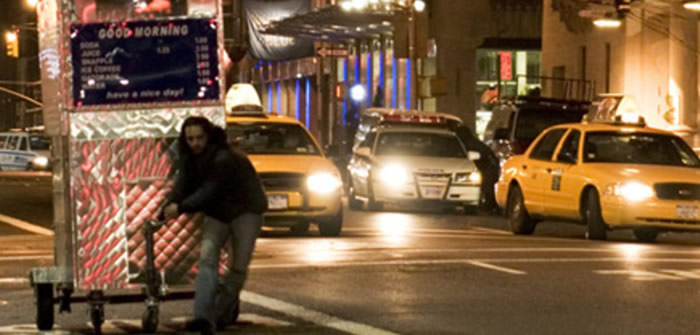Born and raised in the United States, Ramin Bahrani studied film at Columbia University in New York City before moving to his parents’ homeland of Iran, where he lived for three years. After spending time in Paris, he eventually returned to the United States to begin work on his first feature film, MAN PUSH CART (2005). The film premiered at the Venice Film Festival (2005) and was selected for the Sundance Film Festival (2006) before being released theatrically to critical acclaim. His second feature film, CHOP SHOP (2007) premiered at the Cannes Film Festival. Bahrani is currently finishing his third feature, SOLO
Cinema Without Borders: How did you come up with the concept of “Man Push Cart? Was it based on a real character you knew?
Ramin Bahrani: When Bush began to bomb Afghanistan after September 11, 2001, I began to think of the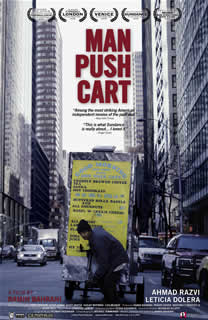 Afghans that I knew who lived outside of Iran—where my parents are from and where I lived for several years after college. I thought about the push cart venders in New York, and the idea of that job and that cart seemed like an interesting one for a film. When I thought about them dragging that cart it made me think about Albert Camus’ book, The Myth of Sisyphus, which has always been an important book to me and provides an important idea about life. It seemed like a strong enough image to base a film around, so I went back to New York and began to meet and spend as much time as possible with push cart venders. I did this for almost two years and met Afghans, Pakistanis, Egyptians, Bangladeshis, and in that process I met the “real” Ahmad who plays the lead. He was a Pakistani, and he had been a push cart vender. I began to focus and adapt my script based on his real life.
Afghans that I knew who lived outside of Iran—where my parents are from and where I lived for several years after college. I thought about the push cart venders in New York, and the idea of that job and that cart seemed like an interesting one for a film. When I thought about them dragging that cart it made me think about Albert Camus’ book, The Myth of Sisyphus, which has always been an important book to me and provides an important idea about life. It seemed like a strong enough image to base a film around, so I went back to New York and began to meet and spend as much time as possible with push cart venders. I did this for almost two years and met Afghans, Pakistanis, Egyptians, Bangladeshis, and in that process I met the “real” Ahmad who plays the lead. He was a Pakistani, and he had been a push cart vender. I began to focus and adapt my script based on his real life.
 CWB: Was he the one who ended up playing the part?
CWB: Was he the one who ended up playing the part?
Ramin: Yes I re-wrote it for him, and he accepted to play the role in the film.
CWB: What about the other actors in the film, were there any other ordinary people or actors?
Ramin: It was a mix of ordinary people, and some people who had training before.
CWB: The girl was beautiful and an excellent actress.
Ramin: Yes, she had come from Spain and had already done a few projects. I think she is incredibly charming and brought great energy tothe film. Her part is important in countering Ahmad’s situation.
CWB: How did you deal with the actors as far as guiding them? I think that the acting was a brilliant part of “Man Push Cart.”
Ramin: Thank you. I have many different techniques, many of which have been used by other directors whom I really respect. I never say “action” or “cut”—these things don’t make sense to me. “Action” means to end reality and begin acting and “cut” means the opposite, and I don’t know why anyone would want to do that. I also don’t show the script to the actors. We do intense rehearsal in advance where I express to them what the scene is about and what there dialogues are. They remember just enough of the dialogue that they start to say it with their own words but with the same drive and goal of each scene and we do a lot of takes. I think this helps bring authenticity to the film.
things don’t make sense to me. “Action” means to end reality and begin acting and “cut” means the opposite, and I don’t know why anyone would want to do that. I also don’t show the script to the actors. We do intense rehearsal in advance where I express to them what the scene is about and what there dialogues are. They remember just enough of the dialogue that they start to say it with their own words but with the same drive and goal of each scene and we do a lot of takes. I think this helps bring authenticity to the film.
CWB: “Man Push Cart” gives a very different view of New York. How long have you been living in New York, and how did you come up with this effective visual side of this film?
Ramin: I went to college in New York, Columbia University,in the 90s moved away, and then have been living in New York again since 2002. I have been there for a total of 8 or 9 years now. I don’t spend a lot of my time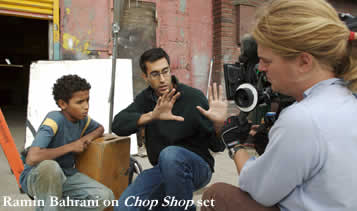 in fancy places and don’t have the resources to do that. I don’t think that most of the population of New York, nor the world, does. I want to focus on ordinary day-to-day activities that most New Yorkers can relate to. I wanted to flip the situation and focus on the worker in that cart as opposed to the affluent people we tend to see in films—be they Hollywood or independent. I wanted to shoot a lot at night. New York is a 24-hour-a-day city and I wanted to see what happens in the night when people are preparing for the people who come in the day. When you have a chance to see “Chop Shop” and the film I am working on now, a lot of times people have said to me or written about my films saying that my these films are about marginal characters. I don’t know what that means anymore because I think I am making films about how the majority of the population lives, which is day-to-day, dollar-by-dollar, trying to make a living and get by. I would say that is how four billion people in the world if not more live. I think the demographics we see racially and economically in cinema is representative of about one or two percent of the population of the world—I think those are the marginal characters. They are just manipulating the dreams of the world.
in fancy places and don’t have the resources to do that. I don’t think that most of the population of New York, nor the world, does. I want to focus on ordinary day-to-day activities that most New Yorkers can relate to. I wanted to flip the situation and focus on the worker in that cart as opposed to the affluent people we tend to see in films—be they Hollywood or independent. I wanted to shoot a lot at night. New York is a 24-hour-a-day city and I wanted to see what happens in the night when people are preparing for the people who come in the day. When you have a chance to see “Chop Shop” and the film I am working on now, a lot of times people have said to me or written about my films saying that my these films are about marginal characters. I don’t know what that means anymore because I think I am making films about how the majority of the population lives, which is day-to-day, dollar-by-dollar, trying to make a living and get by. I would say that is how four billion people in the world if not more live. I think the demographics we see racially and economically in cinema is representative of about one or two percent of the population of the world—I think those are the marginal characters. They are just manipulating the dreams of the world.
CWB: That is an interesting statement and I think it’s quite true. “Man Push Cart” is a film about the present, but also portrays things about man through history. 
Ramin: I hope so. I am interested in the basic question of how do you live in this world, and I think that has always been an issue for anyone who’s conscious. Questions of your fate, free will, and who is doing the pushing—the man or the cart? There is a Rumi poem that says, “I am the polo stick you are the ball, wherever I hit you you must go, and wherever you go I must follow.” As in Man Push Cart, who is doing the pushing—the man or the cart? It is a question I have always thought about. I think it is strange that in the film, what disturbs Ahmad the most is losing the thing he is trapped by. Somehow, in the end, the place he feels most comfortable in is within the confines of his cart and I think that is a strange but true paradox to our life.
CWB: Please tell us a little bit about your background. I understand that you have some sort of connection to Iran.
Ramin: Both my parents are Iranian. I was born and raised in North Carolina before I left to attend Columbia University in New York. I lived in Iran for almost three years starting in 1998 and that was a very important experience in my life. I think it helped me re-imagine how I would view the world and myself and that also reflects upon my cinema.
CWB: Did you have contact with any Iranian filmmakers?
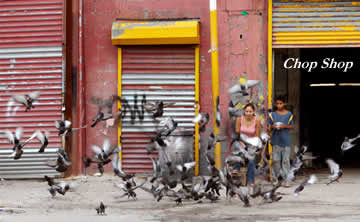 Ramin: Yeah, I did a medium length film—a thesis-like film—in Iran. I had done a lot of shorts in America. “Man Push Cart” was my first feature length film. Being in Iran enabled me to meet with several filmmakers like Kiarostami, but I think more critical was living there and experiencing day-to-day life over the course of three years I would like to say that “Chop Shop”, my second film, premiered in Cannes and got a very positive reaction from the press and a gentleman in “Variety” wrote very positive things about the film but also some other issues which I find problematic. One was that I was an Iranian Émigré—which is just a factual error, no big deal—but it was the next part of his review coupled with that which made me wonder. He wrote that my film was told in a third world style of filmmaking. I can only assume that he believes that I have made a film in the “Iranian style.” What does that mean exactly? There is a myriadof Iranian cinema, a Makhmalbaf film is not like a Beizaei film and a Beizaei film has nothing to do with a Kiarostami film. Then I assume that this reviewer assumes that Iran is a third world country. What does it mean—third world country?. My cinematic influences extend well beyond Kiarostami. Before Kiarostami there is Rossellini, Ken Loach, Eric Wiseman, Ozu, Robert Bresson, Robert Flaherty, Fellini. I want to know if the writer from “Variety” believes England, Italy, Japan, France and America are all third world countries.
Ramin: Yeah, I did a medium length film—a thesis-like film—in Iran. I had done a lot of shorts in America. “Man Push Cart” was my first feature length film. Being in Iran enabled me to meet with several filmmakers like Kiarostami, but I think more critical was living there and experiencing day-to-day life over the course of three years I would like to say that “Chop Shop”, my second film, premiered in Cannes and got a very positive reaction from the press and a gentleman in “Variety” wrote very positive things about the film but also some other issues which I find problematic. One was that I was an Iranian Émigré—which is just a factual error, no big deal—but it was the next part of his review coupled with that which made me wonder. He wrote that my film was told in a third world style of filmmaking. I can only assume that he believes that I have made a film in the “Iranian style.” What does that mean exactly? There is a myriadof Iranian cinema, a Makhmalbaf film is not like a Beizaei film and a Beizaei film has nothing to do with a Kiarostami film. Then I assume that this reviewer assumes that Iran is a third world country. What does it mean—third world country?. My cinematic influences extend well beyond Kiarostami. Before Kiarostami there is Rossellini, Ken Loach, Eric Wiseman, Ozu, Robert Bresson, Robert Flaherty, Fellini. I want to know if the writer from “Variety” believes England, Italy, Japan, France and America are all third world countries.
CWB: I would like to invite the writer from Variety for a ride and a lunch so I can take him around Los Angeles to show him something about the third world.
Ramin: I don’t know what the Third World means, and from what privileged position does someone make this comment. I don’t think this kind of comment is intended to be malicious, but I think peoples’ brains have been flipped into a coma from centuries of colonialism. As someone who was born and raised and is living in a country who has colonized and has also come from a country that has been attempted to be colonized, I refuse to have some so-called critic attempt to delegitimize me or my cinema. I will not be belittled nor have Iran be belittled or any other country that this gentleman will claim to be Third world.
CWB: I think that these feelings and ideas from certain people come from a sort of isolation that exists and this leads many to assume that people from distant countries are different and less-developed. Sometimes, when they admire someone but look down on them like that, I see it as an insult.
countries are different and less-developed. Sometimes, when they admire someone but look down on them like that, I see it as an insult.
Ramin: This same Variety critic knows and adores Abbas Kiarostami. I would love to hear this person tell Kiarostami that he lives and works in a third world country and makes third-world style cinema. I would be curious to see if he would have the guts to say it, and what the reaction would be. Again, I don’t think this person is malicious and intending to make racist, xenophobic, colonialist comments. Nevertheless, he must wake up from his middle-aged slumber.
CWB: Fortunately, you are making films that are real, and are not like mainstream Hollywood lies.
Ramin: I would reiterate he wrote a positive review and “Variety” wrote a positive review of “Man Push Cart” as well, but you have to be aware of what you are writing.
CWB: I think you are a bridge between an active cinema and a passive one. In general what do you think about cinema in the world today, and which filmmakers do you really like.
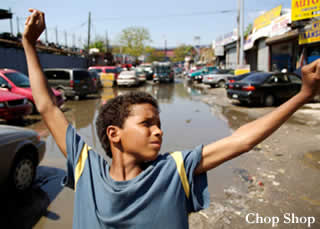 Ramin: I think it is a very tough position for cinema. Why? We just lost two of the greats: Bergman and Antonioni. I think if we go back to the sixties and we were to go to New York City at the time and asked ten people on the street if they knew who they were and if that had seen their films, probably seven people would say yes I have seen a film or heard of them. If we go into the New York City today and asked ten people if they had seen a Kairostami film or Dardennes’ Brothers film, I think maybe two people would know what you were talking about. I think they are comparable because they are both winners of Cannes and considered the greatest masters of today. It is a tough time for cinema that attempts to be anything more than a video game or a clever poster or marketing campaign.
Ramin: I think it is a very tough position for cinema. Why? We just lost two of the greats: Bergman and Antonioni. I think if we go back to the sixties and we were to go to New York City at the time and asked ten people on the street if they knew who they were and if that had seen their films, probably seven people would say yes I have seen a film or heard of them. If we go into the New York City today and asked ten people if they had seen a Kairostami film or Dardennes’ Brothers film, I think maybe two people would know what you were talking about. I think they are comparable because they are both winners of Cannes and considered the greatest masters of today. It is a tough time for cinema that attempts to be anything more than a video game or a clever poster or marketing campaign.
CWB: But at the same time, I think there or more and more filmmakers who are making great films around the world. The numbers of festivals have grown at such a great number, and this may change things hopefully.
Ramin: Then you get into things that are boring for someone to read about and are more conversations for an accountant which is, how do you pay for these films? How do you sell them? And who is going to buy them and watch them; who is going to pay for the advertising for them? This is quite a challenge for someone who takes cinema as an art. I have been lucky. My films have been financed and they have sold around the world and made their money back. But it is really hard.
CWB: How has “Man Push Cart” been doing as far as theater screenings?
Ramin: “Man Push Cart” exceeded our expectations. We made the film and were not sure if anyone was going to watch it. It went to the best festivals (Venice, Sundance, London, and many others) and was sold theatrically around the world, inlcuding the US For a film that had no known actors and an unknown director and not an exploitative subject matter, it did very good. The response was great; it won a lot of awards and three independent spirit award nominations, including one for best actor. Ahmad was nominated along with Forest Whittaker and Edward Norton.
CWB: How are the DVDs going to be distributed in the US?
Ramin: It is coming out Oct. 9 through Koch Lorber Films, which is a great company. You can go to Netflix or Amazon and order it. 
CWB: Tell us about your new film and your future projects.
Ramin: “Chop Shop” is about a 12 year old young Latino boy who is a street orphan. He lives and works in an auto-body shop in Queens where he is trying to make a life for himself and his 16 year old sister. The auto body shop is across from 20 blocks of a junk yard right across the street from Shea Stadium where there is a big sign that says “Make Dreams Happen.” These kids are trying to make their dreams happen in these junk yards. That film was finished in April of this year and it premiered in May in Cannes, and went to Toronto and next is going to London. It is coming to LA at the AFI film festival in November. I am doing a project now called “Solo” which is about a Senegalese taxi driver who is 30-something years old in Winston-Salem, North Carolina, which is a suburban town in the south. He drives the taxi at night. The first scene in the movie involves Solo and William, who is a 70 year old Caucasian man, who hires Solo to drive him in 12 days time to a mountain two hours away called Blowing Rock, where he plans to kill himself. Solo has 12 days to befriend William and convince not to kill himself.

